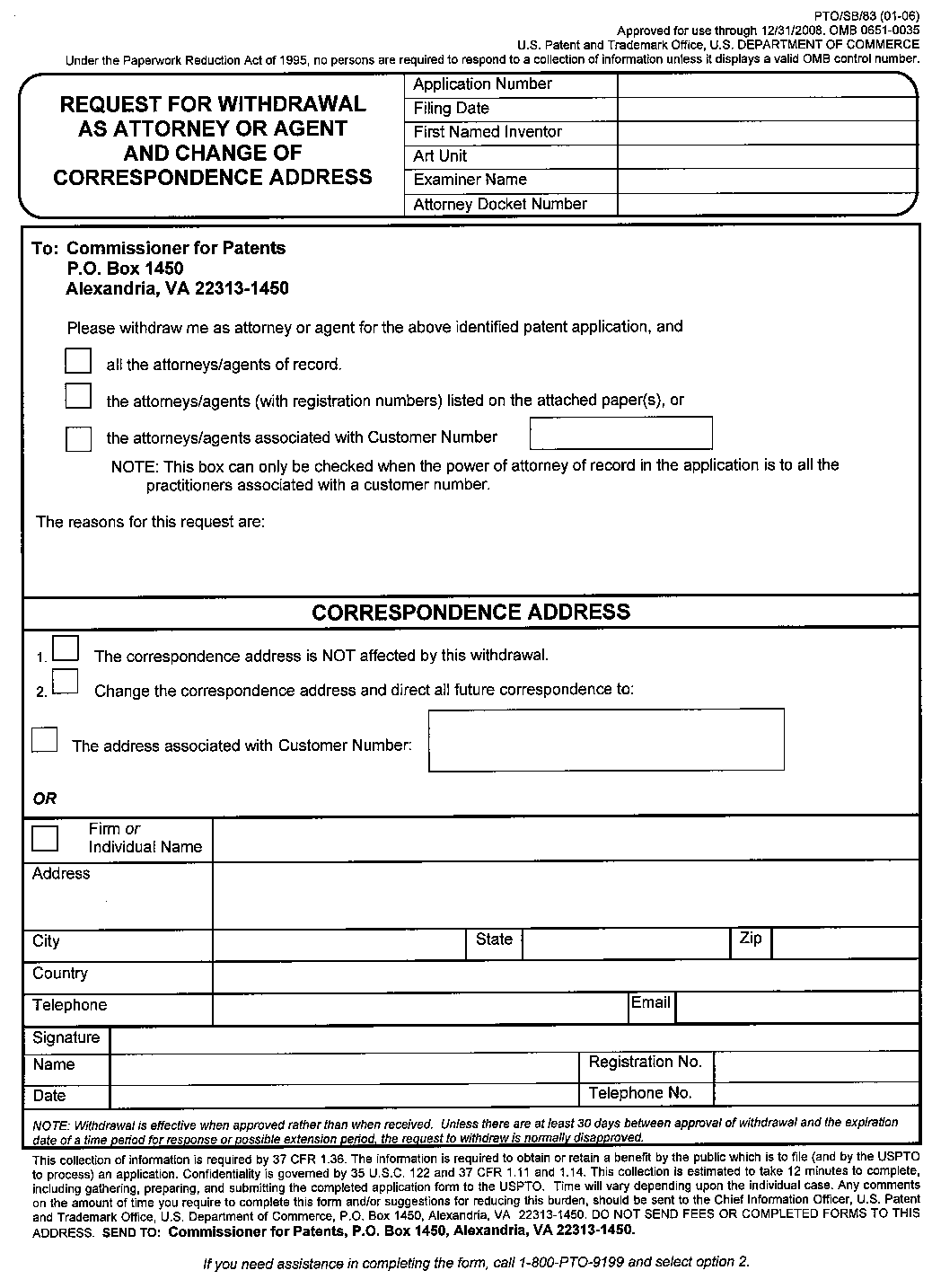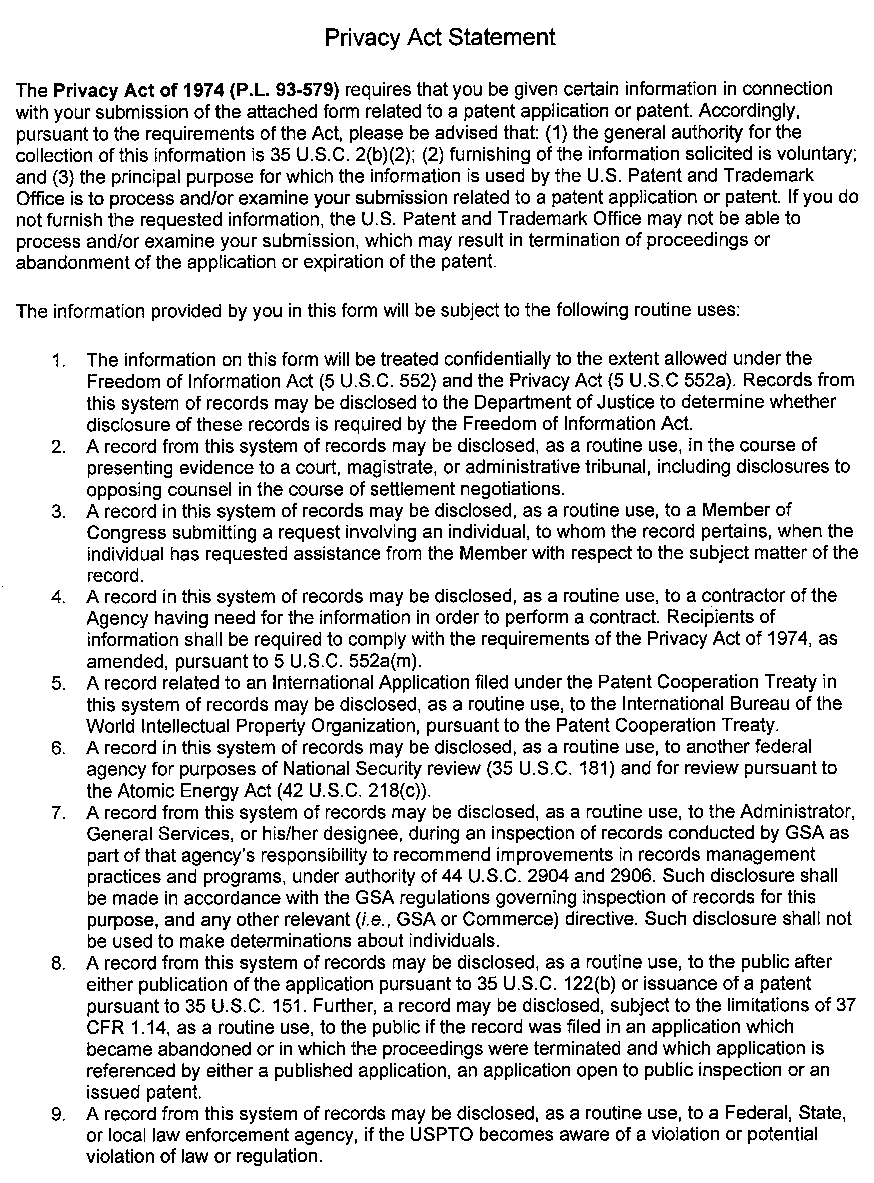Notice regarding Section 508 of the Workforce Investment Act of 1998. Section 508 of the Workforce Investment Act of 1998 requires all United States Federal Agencies with websites to make them accessible to individuals with disabilities. At this time, the MPEP files below do not meet all standards for web accessibility. Until changes can be made to make them fully accessible to individuals with disabilities, the USPTO is providing access assistance via telephone. MPEP Interim Accessibility Contact: 571-272-8813.
402.06 Attorney or Agent Withdraws [R-5] - 400 Representative of Inventor or Owner
402.06 Attorney or Agent Withdraws [R-5]
37 CFR 1.36 Revocation of power of attorney; withdrawal of patent attorney or agent.
*****
(b) A registered patent attorney or patent agent who has been given a power of attorney pursuant to § 1.32(b) may withdraw as attorney or agent of record upon application to and approval by the Director. The applicant or patent owner will be notified of the withdrawal of the registered patent attorney or patent agent. Where power of attorney is given to the patent practitioners associated with a Customer Number, a request to delete all of the patent practitioners associated with the Customer Number may not be granted if an applicant has given power of attorney to the patent practitioners associated with the Customer Number in an application that has an Office action to which a reply is due, but insufficient time remains for the applicant to file a reply. See § 41.5 of this title for withdrawal during proceedings before the Board of Patent Appeals and Interferences.
See 37 CFR 1.36(a) in MPEP § 402.05 for revocation. See 37 CFR 10.40 for information regarding permissive and mandatory withdrawal. When filing a request to withdraw as attorney or agent of record, the patent attorney or agent should briefly state the reason(s) for which he or she is withdrawing so that the Office can determine whether to grant the request. >Note that disciplinary rule, 37 CFR 10.40(a) provides that a "practitioner shall not withdraw from employment until the practitioner has taken reasonable steps to avoid foreseeable prejudice to the rights of the client." Among several scenarios addressed in 37 CFR 10.40(c), subsections (iv) and (vi) permit withdrawal when the client fails to compensate the practitioner, or when "other conduct on the part of the client has rendered the representation unreasonably difficult." When preparing a request for withdrawal for such reasons, the practitioner should also be mindful of 37 CFR 10.57(b)(2), which prohibits the use of a confidence or secret of a client to the disadvantage of a client. Where withdrawal is predicated upon such reasons, the practitioner, rather than divulging confidential or secret information about the client, should identify the reason(s) for requesting to withdraw as being based on "irreconcilable differences." An explanation of and the evidence supporting "irreconcilable differences" should be submitted as proprietary material in accordance with MPEP § 724.02 to ensure that the client's confidences are maintained.<
In the event that a notice of withdrawal is filed by the attorney or agent of record, the file will be forwarded to the **>appropriate official for decision on the request<. The withdrawal is effective when approved rather than when received.
To expedite the handling of requests for permission to withdraw as attorney or agent, under 37 CFR 1.36(b), Form PTO/SB/83 may be used. Because the Office does not recognize law firms, each attorney of record must sign the notice of withdrawal, or the notice of withdrawal must contain a clear indication of one attorney signing on behalf of himself or herself and another. A withdrawal of another attorney or agent of record, without also withdrawing the attorney or agent signing the request is a revocation, not a withdrawal.
The Director of the United States Patent and Trademark Office usually requires that there be at least 30 days between approval of withdrawal and the later of the expiration date of a time period for reply or the expiration date of the period which can be obtained by a petition and fee for extension of time under 37 CFR 1.136(a). This is so that the applicant will have sufficient time to obtain other representation or take other action. If a period has been set for reply and the period may be extended without a showing of cause pursuant to 37 CFR 1.136(a) by filing a petition for extension of time and fee, the practitioner will not be required to seek such extension of time for withdrawal to be approved. In such a situation, however, withdrawal will not be approved unless at least 30 days would remain between the date of approval and the last date on which such a petition for extension of time and fee could properly be filed.
For withdrawal during reexamination proceedings, see MPEP § 2223.
Form PTO/SB/83 may be used to request withdrawal of attorney or agent of record.
**>
